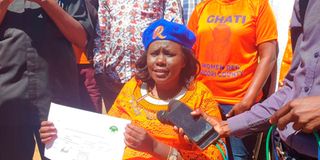Why political parties must view disability from rights-based lens

Nominated MP Dennita Ghatti who represents persons with disabilities after she was cleared by IEBC to vie for Migori woman rep. Ian Byron | Nation Media Group The Azimio la Umoja One Kenya Coalition Party recently launched its manifesto and, within it, there is a short part on PWDs.
When persons with disabilities (PWDs), through their representative organisations, negotiated the United Nations Convention on the Rights of Persons with Disabilities (CRPD), there is one thing that was easily agreed upon. That was, how disability is viewed had to move away from previously held perspectives of seeing PWDs: Medical, as people needing to be put on treatment; and charity, as people who only need charity and protection.
The CRPD brought about what has been seen as a paradigm shift, whereby it is acknowledged that the barriers within environments are the issues that must be addressed. Actually, the CRPD states that disability results from the interaction between persons with impairments and attitudinal and environmental barriers that hinder their full and effective participation in society on an equal basis with others.
Therefore, for society to include a PWD within it, then it ought to do away with many barriers that impede the person’s participation in community. These include physical barriers. Think of many places that are physically inaccessible to persons with disabilities. Think of public transportation, which is largely inaccessible to PWDs.
Communication barriers
Think of information and communication barriers; how, for example, many events do not take into consideration budgeting for sign language interpretation; how websites are not accessible to people using screen readers. Think of the negative attitudes towards persons with intellectual and psychosocial disabilities.
The list is not exhaustive but just a pointer to the many barriers that prevent the participation of PWDs within communities.
What are the consequences? Many children with disabilities out of school. Many women with disabilities not accessing quality healthcare. Many PWDs not accessing work and employment, or social protection and housing, among other rights that are crucial to support their community inclusion.
Undermines their ability
The Azimio la Umoja One Kenya Coalition Party recently launched its manifesto and, within it, there is a short part on PWDs. In one line, the manifesto notes that a large number of Kenyans with disabilities live with different forms of disability and this undermines their ability to actively participate in the development of the country. That is erroneous.
As human beings, we are diverse; that is part of the human experience. Our identities. A mental impairment, for instance, should not and cannot be the reason to undermine one’s ability to participate in an activity. The negative attitudes are the deterrent that bar one from participation. Impairment should not make society view PWDs as lesser beings.
The Azimio manifesto states the need to integrate PWDs and make them feel part and parcel of society. Whose onus is it todo so? No one. A person without disability must not, for once, feel that it is their responsibility to make a PWD feel part and parcel of community. That is ableism. It has to be nipped in the bud. The society belongs to all—in all their diversities. We must not ‘other’ one another.
Political parties must, and should, engage with a rich and wide diversity of PWDs as they are coming up with their manifestos. The mantra of the disability movement is ‘Nothing about us without us’. How are parties engaging meaningfully with the movement to ensure that the solutions they provide for PWD inclusion are not based on paternalistic views, where a picture is painted of them as ‘the other’ that ‘need to be helped’.
Marginalised groups, such as PWDs, will further be marginalised if they continue to be viewed from charity perspectives. And these perspectives will only change when we meaningfully and continually engage these groups, in their diversities, to understand their priorities and how to advance these priorities from rights-based perspectives.
Ms Ombati, identifying as a woman with a psychosocial disability, is a disability rights advocate. [email protected].





